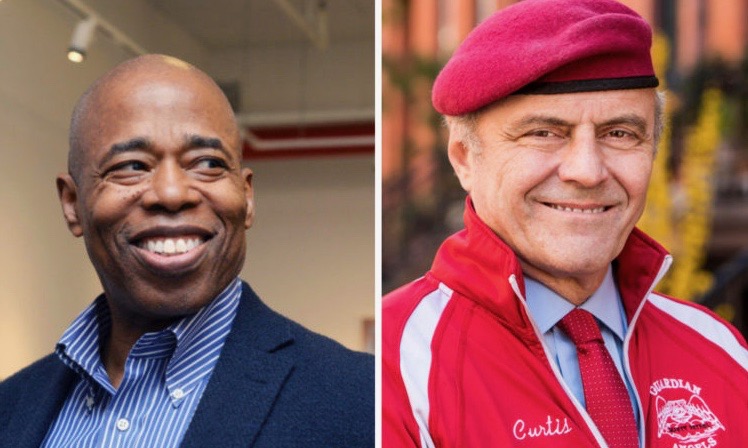Both bombastic personalities with sometimes polar opinions on the issues facing the city, Democrat Eric Adams, the current Brooklyn borough president and former NYPD captain, and Republican and Guardian Angels founder Curtis Sliwa clashed in the first few minutes of the Wednesday debate.

Erica Sherman/Brooklyn BP’s Office, Sliwa for NYC Mayo
Mayoral candidates Eric Adams, left, and Curtis Sliwa, right.Mayoral hopefuls Eric Adams and Curtis Sliwa faced off in the first of two official general election debates on Wednesday evening, sparring on subjects including Mayor Bill de Blasio’s new COVID-19 vaccine mandate, crime and police tactics, and kickstarting the city’s economy.
Both bombastic personalities with sometimes polar opinions on the issues facing the city, Democrat Adams, the current Brooklyn borough president and former NYPD captain, and Republican and Guardian Angels founder Sliwa clashed in the first few minutes of the Wednesday debate, which was hosted by NBC 4 New York.
Asked about de Blasio’s just-announced vaccine mandate for city employees—who could now be sidelined from their duties if they are not vaccinated—Adams said he thought the move was “correct” given the impact of the ongoing pandemic.
Sliwa, clad in his signature red beret, disagreed, saying frontline workers could be kept safe without the new mandate.
“I did not see Mr. Sliwa on the ground when I moved into [Brooklyn] Borough Hall to respond to the crises that we were experiencing,” Adams said in response. “It’s easy to talk about what happened. I was there, and he was absent.”
The moment was one of a number of hotpoints during the fairly memeable Wednesday debate, during which Adams stressed his leadership experience and working-class background and Sliwa worked hard to woo Democratic voters by painting Adams as an iteration of de Blasio, with whom he has frequently disagreed.
Here are the top topics that came up Wednesday:
Crime and policing: Adams and Sliwa, who both have backgrounds in public safety, spent a sizable portion of the Wednesday hour debating strategies on crime reduction and leading the nation’s largest police department.
Both candidates have embraced more moderate positions on policing; neither wants to “defund the police,” and the two support more aggressive policing tactics including stop-and-frisk, which was found unconstitutional in 2013.
READ MORE: In Advocating ‘Precision Policing,’ Adams Embraces a Term Police Critics Have Targeted
Unlike Adams, however, Sliwa says he wants to hire thousands more police officers.
“I’m the only candidate standing on this stage that has said I will hire more police officers,” Sliwa said. These cops, which Sliwa said “we desperately need,” would be paid in part through taxes levied on entertainment venues like Madison Square Garden and private universities like NYU and Columbia.
The spiciest moment of the exchange took place here, with Adams and Sliwa trading barbs around the allegations that Sliwa made up crimes for clout, including a faked kidnapping.
“I made mistakes,” Sliwa said. “I was immature at the age of 25, did things I should not have done. I’ve earned the trust of New Yorkers.”
Reigniting New York’s economy: Asked what ways they will entice businesses and workers to return to city offices, Adams said, “It’s too expensive, too bureaucratic, too difficult to do business in New York City.” If elected, he said he would “suspend all fines” to small businesses.
READ MORE: Opinion: Is New York City Really Anti-Business?
“We are an unfriendly city to businesses,” he added, echoing comments he’s made previously.
Sliwa, in one of his standout moments of the evening, stressed that workers might never return to full-time, in-person work, and that the city should seriously consider repurposing office space and developing more affordable housing.
“Look at the Hudson Yards—what are we going to do, turn it into mausoleums?” he said.
“There are no tenants, there are no people to lease that space,” he added. “We better start appropriating a concept and an idea of turning it into affordable housing and make utilization of that space. You’ve never going to use it for commercial purposes solely any longer.”
The environment and our changing climate: Moderators of the Wednesday debate asked two questions about the climate, an increasingly urgent topic for New York.
One of Adams’ strongest moments last night came in his answer to a question about how he would handle a massive storm like Hurricane Ida, during which 13 New Yorkers drowned in their homes and vehicles.
The Brooklyn borough president, who clearly gave this some thought, proposed a response strategy akin to howthe city handles terrorism: If an environmental threat reaches a certain level, each agency will have a predetermined plan in place.
“We were caught off-guard,” Adams said of the September storm. “That can never happen again.”
Sliwa’s answer to the question—one of a few of his rambling, reactionary rebuttals Wednesday night that didn’t quite land—was fairly weak, a reflection of his lack of familiarity with subjects beyond crime and safety. Instead, he used the moment to attack the de Blasio administration’s progress on building seawalls, rather than talk up his own proposals.
Three things we wish got more airtime Wednesday:
Affordable housing: Definitely deserved more focus. Given the ongoing housing crisis—and the looming eviction crisis—it’s unfortunate that housing was not a bigger subject.
The moderators did ask one question about converting hotels into housing and another about the senior housing crisis during the last 15 minutes of the debate. (Adams offered an interesting proposal on moving seniors in NYCHA buildings into new apartments and repurposing their older, often bigger, units.)
Universal child care: Got one mention Wednesday night, when Adams discussed his plans for the economy. De Blasio’s universal pre-K plan is arguably one of his most popular programs, and universal childcare, if adopted by the next mayor, is likely to be a game-changer for city workers.
Hunger: Food insecurity is a major issue for New Yorkers. It’s unfortunate that nothing was said about this problem on Wednesday night—it’s a defining point for so many, especially during the pandemic.
The two candidates are set to debate once more on Tuesday, the last before the Nov. 2 election. Early voting starts on Saturday.









